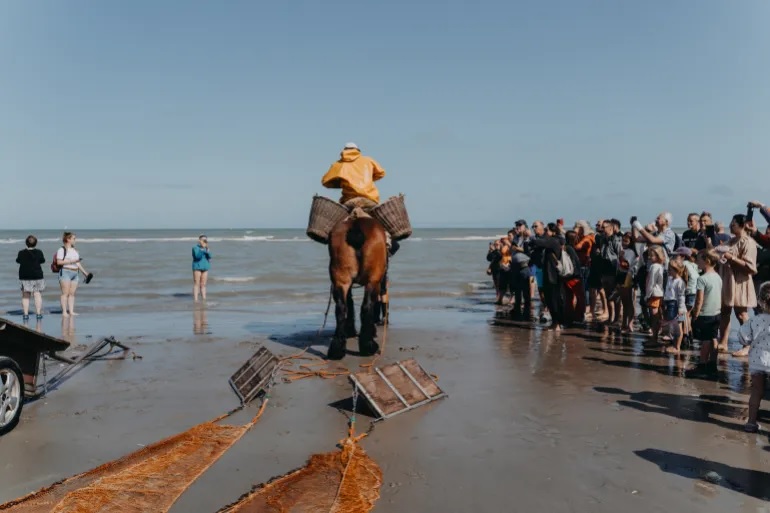
The Future of Belgium’s Centuries-Old Horseback Shrimp Fishing Tradition
In the coastal village of Oostduinkerke, Belgium, the centuries-old tradition of horseback shrimp fishing remains a unique practice, now limited to this location. Gregory Debruyne, a 27-year-old fisherman, continues the tradition he learned from his father, using his Belgian draught horse, Kelly, to fish for brown shrimp in the shallow waters of the North Sea. This method, passed down through generations, has become a cultural symbol for the community.
Horseback shrimp fishing dates back to the 15th century and has been recognized by UNESCO as an Intangible Cultural Heritage of Humanity. Originally practiced by local farmers to provide shrimp and fish for nearby monasteries, the tradition once spread across northern Europe. Today, only 12 families in Oostduinkerke continue the practice. Wearing yellow waterproof gear, the fishermen and their horses wade through the sea, pulling nets to catch shrimp.
However, the tradition faces challenges from climate change and a declining shrimp population. The fishermen, who usually fish several times a week during the summer and peak shrimp season in October, are catching fewer shrimp than in previous years. In some cases, they return with little to show for their efforts. The small catch is often consumed personally or shared with family, rather than sold at the market.
Fisheries experts, such as Hans Polet from the Institute for Agriculture, Fisheries, and Food Research, highlight that climate change is affecting shrimp populations. Rising sea temperatures and changing weather patterns are impacting shrimp breeding success, and the migration of predator species like codfish is further contributing to the decline. Polet explains that shrimp, which have a short lifespan, are sensitive to these environmental shifts, making their populations fluctuate year by year.
Despite these difficulties, the horseback shrimp fishermen are determined to keep the tradition alive. For many, it is not just a livelihood but a cultural practice deeply rooted in their connection to the sea and their horses. Eddy D’Hulster, a retired shrimp fisherman, fondly remembers his early days of fishing on horseback and notes that the tradition has been passed down through families for generations. The local municipality also supports the practice by offering financial assistance to promote the tradition as a tourist attraction.
As climate change continues to affect the ecosystem, the future of horseback shrimp fishing may depend on the adaptability of both the fishermen and the environment. However, the community remains hopeful that this unique practice will endure, preserving a centuries-old cultural heritage.
Stichworte







